Panopea abrupta is an extinct species of large marine bivalve mollusc in the family Hiatellidae. Between 1983 and 2010, this species of clam was confused with the Pacific geoduck, Panopea generosa, in the scientific literature.
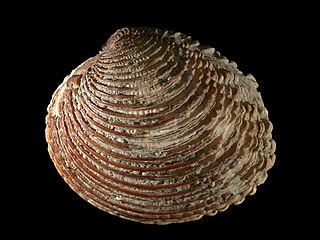
The Veneridae or venerids, common name: Venus clams, are a very large family of minute to large, saltwater clams, marine bivalve molluscs. Over 500 living species of venerid bivalves are known, most of which are edible, and many of which are exploited as food sources.
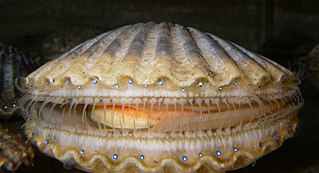
The Pteriomorphia comprise a subclass of saltwater clams, marine bivalve molluscs. It contains several major orders, including the Arcida, Ostreida, Pectinida, Limida, Mytilida, and Pteriida. It also contains some extinct and probably basal families, such as the Evyanidae, Colpomyidae, Bakevelliidae, Cassianellidae, and Lithiotidae.

Heteroconchia is a taxonomic infraclass of diverse bivalve molluscs, belonging to the subclass Autobranchia.

Fissurellidae, common name the keyhole limpets and slit limpets, is a taxonomic family of small to medium-sized limpet-like sea snails, marine gastropod molluscs in the clade Vetigastropoda.

Mactridae, common name the trough shells or duck clams, is a family of saltwater clams, marine bivalve mollusks in the order Venerida.

Anomalodesmata is an superorder of saltwater clams, marine bivalve molluscs. This grouping was formerly recognised as a taxonomic subclass. It is called a superorder in the current World Register of Marine Species, despite having no orders, to parallel it with sister taxon Imparidentia, which does have orders.

Periplomatidae is a family of large marine bivalves of the Anomalodesmata order.
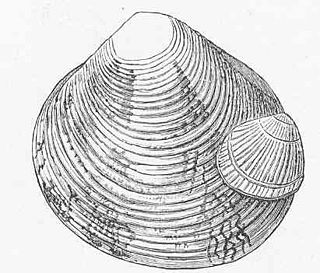
Myochamidae is a family of saltwater clams, marine bivalves in the order Anomalodesmata.

Turritellidae, with the common name "tower shells" or "tower snails", is a taxonomic family of small- to medium-sized sea snails, marine gastropod molluscs in the Sorbeoconcha clade.
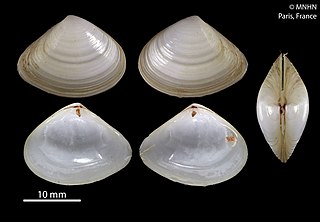
Mesodesmatidae is a family of saltwater clams, marine bivalve mollusks in the order Venerida.
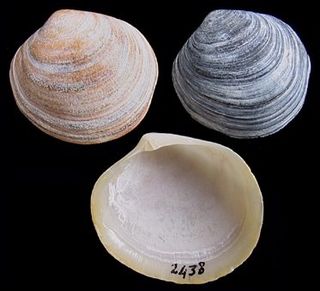
Ungulinidae is a family of marine bivalve molluscs in the order Venerida.

Spisula is a genus of medium-sized to large marine bivalve mollusks or clams in the subfamily Mactrinae of the family Mactridae, commonly known as surf clams or trough shells.
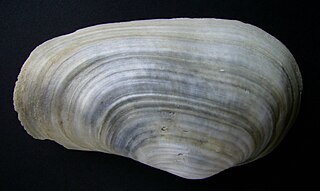
Panopea is a genus of large marine bivalve molluscs or clams in the family Hiatellidae. There are 10 described species in Panopea. Many of them are known under the common name "geoduck".

Panopea zelandica, commonly known as the deepwater clam or New Zealand geoduck, is a large species of marine bivalve mollusc in the Panopea (geoduck) genus of the family Hiatellidae. It is also sometimes called a king clam, or a gaper – in reference to the shell not being closed at either end.
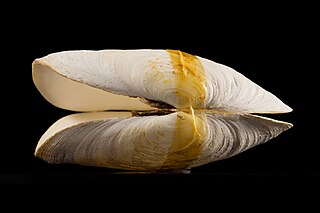
Panopea smithae is a species of large marine bivalve mollusc in the Panopea (geoduck) genus of the family Hiatellidae, found in the waters surrounding New Zealand. While its relative Panopea zelandica lives in shallow waters, P. smithae lives in deeper waters, ranging from deep harbours to the outer continental shelf.

Pectinida is a taxonomic order of large and medium-sized saltwater clams, marine bivalve molluscs, commonly known as scallops and their allies. It is believed that they began evolutionarily in the late Middle Ordovician epoch; many species, of course, are still extant.
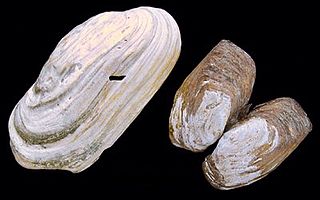
Hiatella is a genus of small saltwater clams, marine bivalve molluscs in the family Hiatellidae.

Pholadidea is a taxonomic genus of marine bivalve molluscs in the subfamily Martesiinae of the family Pholadidae. Most members of Pholididea bore into shale, soft rock and coral for shelter, with the exception of Pholididea (Hatasia) wiffenae, which is a wood-borer.
Lucinida is a taxonomic order of saltwater clams, marine bivalve molluscs.

















